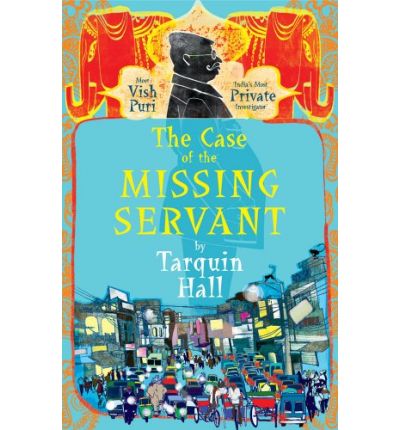Tarquin Hall, The Case of the Missing Servant
reviewed by Danielle L. Parker

The Case of the Missing Servant Publisher: Simon & Schuster, 2009 Length: 310 pages ISBN: 978-1-4165-8368-4 |
The first was Botswana, and while I might yet succeed, the prose so far is so pedestrian I’m not sure I’ll manage to endure Michael Stanley’s Carrion Death. But I was more successful with the other book. Tarquin Hall’s first novel, The Case of the Missing Servant, has been a gentle surprise. Charm, that’s the word I would use for it, the kind that sneaks up on you when you’re not expecting it.
Mr. Hall’s book is set in India — Delhi and Rajasthan, to be exact. One of the myriad charms of this book is the thoroughly convincing local color. Oh, I don’t mean local color of the travelogue variety. What we get from Hall’s book is local color from the inside out. We look out at Hall’s colorful India from the eyes of his characters.
And what a gloriously Indian lot they are. Irritating, prejudiced, parochial, vainglorious, self-satisfied — but still sneaking up on the reader with that insiduous charm, from their fractured English, their old-fashioned Indian virtues and vices, the colorful food and jambalaya of castes, religions, and time-honored superstitions.
The story begins with a detective, of course. Mr. Vishwas Puri, “Chubby” to his family, is the plump proprietor of The Most Private Investigators, Ltd. Mr. Puri is not a humble man. He’s as self-congratulatory as Christie’s Hercule Poirot, and as expansively mustached.
Most of his business is the adulterous and matrimonial grist of everyday detective work, but with an Indian spin: parents checking out potential in-laws prior to arranging a marriage, and so forth. In these endeavors, our Indian Poirot is helped by a cast of colorful characters, not least his widowed and thoroughly capable Mummy. Of course Puri doesn’t want his mother’s help, but as he learns, it’s not easy to keep a strong-willed Mummy from her own meddling.
Mr. Puri is contacted by a desperate lawyer from Rajasthan. (If Mr. Hall’s description of the horrifying Indian justice system is to be believed, and he writes convincingly, don’t commit any crimes on your next visit to the Taj! Once again, we see the author’s sympathetic but unsentimental view of modern day India)
The desperate lawyer, Ajay Kasliwal, is a crusader against corruption. But like Mr. Spitzer, this crusading lawyer has yielded to personal corruption and sampled “take-out” instead of “home cooking” just a little too frequently. Soon the lawyer is hauled off to a stark Indian jail cell, accused of an affair with a low-caste household servant found dead in a ditch. It’s up to Mr. Puri and his legion of employees to ferret out the truth.
It’s to the author’s credit he paints all his characters in the round. We see their uniquely Indian faults and virtues. We don’t experience intense thrills or chills, complicated twists and turns, or white-knuckled tension in this book. But for an armchair excursion to an exotic locale, seen from the inside out, for characters we develop an exasperated affection for, it’s perfect.
So check out Mr. Vish “Chubby” Puri’s inaugural case for yourself. Just be sure to eat heartily first! The food “Chubby” spends so much time with sounds far too tasty. And from where I live, good Indian cooking is probably as far away as the Taj. Oh woe!
Copyright © 2009 by Danielle L. Parker

